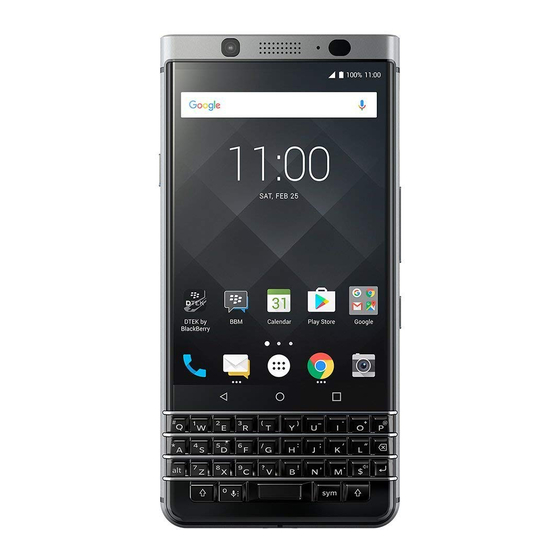Blackberry BBB100-1 안전 및 제품 정보 - 페이지 6
{카테고리_이름} Blackberry BBB100-1에 대한 안전 및 제품 정보을 온라인으로 검색하거나 PDF를 다운로드하세요. Blackberry BBB100-1 9 페이지.

any cables from the computer and unplug any charging accessories from the electrical outlet
before cleaning either your smartphone or the charging accessory.
Repair: Do not attempt to modify, disassemble, or service your smartphone or any charging
accessory. Do not attempt to replace your nonremovable battery. Only qualified service
personnel should perform repairs or battery replacements to your smartphone or charging
accessories, and should use only the battery that the manufacturer specifies for use with your
particular smartphone model.
If any of the following situations occur, disconnect the power supply cables from the computer
or electrical outlet and take your smartphone or charging accessory for service to qualified
service personnel:
• The power supply cord, plug, or connector is damaged.
• Liquid has been spilled or objects have fallen into the smartphone or charging accessory.
• The smartphone or charging accessory has been exposed to rain or water.
• The smartphone or charging accessory becomes very hot to the touch.
• The smartphone or charging accessory has been dropped or damaged in any way.
• The smartphone or charging accessory does not operate normally by following the
instructions in the user documentation.
• The smartphone or charging accessory exhibits a distinct change in performance.
To reduce the risk of fire or electric shock, adjust only those controls that are covered in the
user documentation for your smartphone. An improper adjustment of other controls might
cause damage and will often require extensive work by a qualified technician to restore your
smartphone, charging accessory, or any other accessory to normal operation.
Failure to observe all safety instructions contained in the user documentation for your
smartphone will void the Limited Warranty and might lead to suspension or denial of services
to the offender, legal action, or both.
Smartphone and battery disposal
Do not dispose of either your smartphone or the battery in household waste
bins or in a fire.
Your smartphone and battery are recyclable where facilities exist. This symbol is
not intended to indicate the use of recycled materials.
Dispose of your smartphone and its battery in accordance with the laws and regulations in
your area governing disposal of such cell types.
Compliance information
Exposure to radio frequency signals
The smartphone radio is a low-power radio transmitter and receiver. It is designed to comply
with the following:
• The Council of the European Union guidelines and limits
• Other relevant international guidelines regarding safety levels of radio frequency exposure
for wireless devices
These guidelines were developed by independent scientific experts, governments, and
organizations including the following:
• The International Commission on Non-Ionizing Radiation Protection (ICNIRP)
To maintain compliance with radio frequency exposure guidelines and limits, keep the
smartphone at least 0.20 in. (5 mm) away from your body. When you carry the smartphone
on your body, use only accessories equipped with an integrated belt clip that are supplied
or approved by the manufacturer. If you use a body-worn accessory not supplied by the
manufacturer, verify that the accessory does not contain metal and keep the smartphone at
least 0.20 in. (5 mm) from your body.
To reduce radio frequency exposure: (i) use the smartphone in areas where there is a strong
wireless signal; (ii) use hands-free options; and (iii) reduce the amount of time spent on calls,
or send an email, text message, or BBM message instead.
Specific absorption rate data
THIS WIRELESS DEVICE MODEL MEETS GOVERNMENT REQUIREMENTS FOR EXPOSURE
TO RADIO WAVES WHEN USED AS DIRECTED IN THIS SECTION.
The smartphone is designed and manufactured not to exceed the emission limits for exposure
to radio frequency (RF) energy recommended by The Council of the European Union when
used as directed in the previous section. These limits are part of comprehensive guidelines
and establish permitted levels of RF energy for the general population. The guidelines are
6
